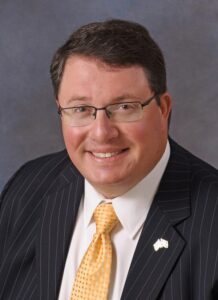Rep. Randy Fine
Like many of you, I remain incredibly troubled by the staggering loss of seagrass in the Indian River Lagoon in Brevard County. It has had real consequences. Since 2009, we’ve lost around 46,000 acres of natural seagrass. As a result, the estuary has been ground zero in the deaths of hundreds of manatees who starved because they could not find enough seagrass, their key food source.
Yet even in the face of these staggering losses, politicians in Tallahassee have introduced legislation this session that will make it even easier to destroy what little natural seagrass we have left. House Bill 349 would create a program to allow developers to pay money so that they can dig up and destroy the remaining natural seagrass in Brevard (or other coastal areas) with the hope that it can be regrown someplace else, possibly the Panhandle or the Gulf Coast.

These politicians argue that to facilitate new coastal development, we need to provide easier opportunities for the private market to mitigate seagrass loss. As one environmental consultant explained during a recent bill presentation, it’s tough to get a permit to destroy seagrass today because there are limited ways to remediate it. So these anti-environmental advocates want to create new ways to remediate seagrass destruction, making it easier to destroy it, and as a result, increase development.
As if the idea of replacing natural Indian River Lagoon seagrass with human-planted replacements in far-off areas of the state wasn’t bad enough, scientists have explained that there is a very low success rate for transplanting seagrass. Some estimate that these human-planted seagrass beds fail to take root two-thirds of the time.
My colleague, Rep. Thad Altman, who similarly opposes this bill, has told the story of helping to replant seagrass as a volunteer — and watching it fail. What little seagrass we have left in our lagoon is arguably the hardiest. It has survived decades of damage and pollution. Why would we make it easier to destroy this when its replacement has a limited possibility of success? And might not even be grown in our community?
In other words, why trade a 100% chance of destruction for an unknown chance of success?
I am not anti-development. None of us should be — our families all moved here from somewhere and needed places to live, work, and play. But as Florida and Brevard continue to boom as people flee terribly managed states to our north for the free state of Florida, we need to ensure that development happens in a smart and environmentally friendly way.
In this case, the math just doesn’t add up. I will not take that risk and neither should the Florida Legislature. Our lagoon and our manatees need help now, and this bill will make our lagoon problems even worse.
Randy Fine is a Republican state representative for the 53rd District of Florida, encompassing Southern Brevard County. This op-ed originally appeared in Florida Today.
Manatee photo credit: Florida Today



